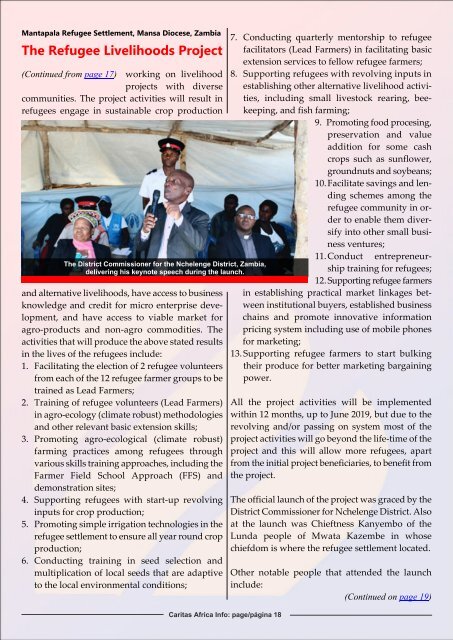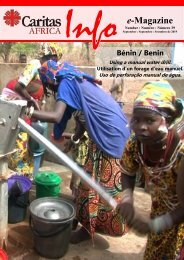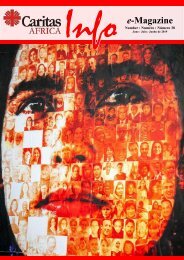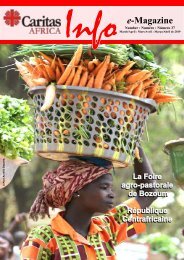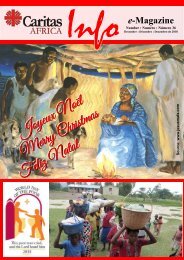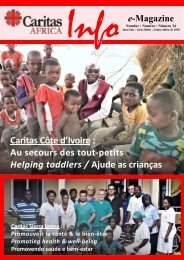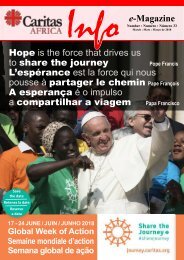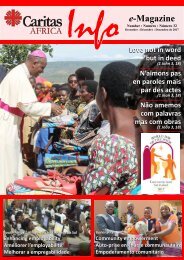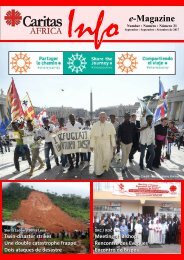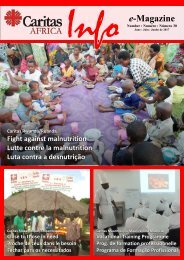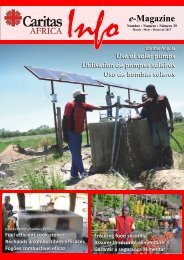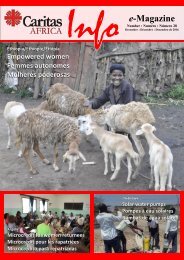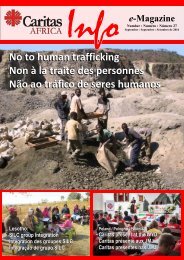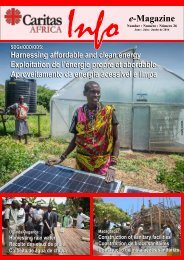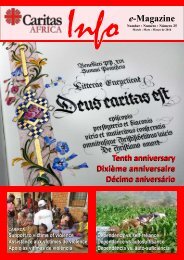Info September 2018
Create successful ePaper yourself
Turn your PDF publications into a flip-book with our unique Google optimized e-Paper software.
Mantapala Refugee Settlement, Mansa Diocese, Zambia<br />
The Refugee Livelihoods Project<br />
(Continued from page 17) working on livelihood<br />
projects with diverse<br />
communities. The project activities will result in<br />
refugees engage in sustainable crop production<br />
The District Commissioner for the Nchelenge District, Zambia,<br />
delivering his keynote speech during the launch.<br />
and alternative livelihoods, have access to business<br />
knowledge and credit for micro enterprise development,<br />
and have access to viable market for<br />
agro-products and non-agro commodities. The<br />
activities that will produce the above stated results<br />
in the lives of the refugees include:<br />
1. Facilitating the election of 2 refugee volunteers<br />
from each of the 12 refugee farmer groups to be<br />
trained as Lead Farmers;<br />
2. Training of refugee volunteers (Lead Farmers)<br />
in agro-ecology (climate robust) methodologies<br />
and other relevant basic extension skills;<br />
3. Promoting agro-ecological (climate robust)<br />
farming practices among refugees through<br />
various skills training approaches, including the<br />
Farmer Field School Approach (FFS) and<br />
demonstration sites;<br />
4. Supporting refugees with start-up revolving<br />
inputs for crop production;<br />
5. Promoting simple irrigation technologies in the<br />
refugee settlement to ensure all year round crop<br />
production;<br />
6. Conducting training in seed selection and<br />
multiplication of local seeds that are adaptive<br />
to the local environmental conditions;<br />
Caritas Africa <strong>Info</strong>: page/página 18<br />
7. Conducting quarterly mentorship to refugee<br />
facilitators (Lead Farmers) in facilitating basic<br />
extension services to fellow refugee farmers;<br />
8. Supporting refugees with revolving inputs in<br />
establishing other alternative livelihood activities,<br />
including small livestock rearing, beekeeping,<br />
and fish farming;<br />
9. Promoting food procesing,<br />
preservation and value<br />
addition for some cash<br />
crops such as sunflower,<br />
groundnuts and soybeans;<br />
10. Facilitate savings and lending<br />
schemes among the<br />
refugee community in order<br />
to enable them diversify<br />
into other small business<br />
ventures;<br />
11. Conduct entrepreneurship<br />
training for refugees;<br />
12. Supporting refugee farmers<br />
in establishing practical market linkages between<br />
institutional buyers, established business<br />
chains and promote innovative information<br />
pricing system including use of mobile phones<br />
for marketing;<br />
13. Supporting refugee farmers to start bulking<br />
their produce for better marketing bargaining<br />
power.<br />
All the project activities will be implemented<br />
within 12 months, up to June 2019, but due to the<br />
revolving and/or passing on system most of the<br />
project activities will go beyond the life-time of the<br />
project and this will allow more refugees, apart<br />
from the initial project beneficiaries, to benefit from<br />
the project.<br />
The official launch of the project was graced by the<br />
District Commissioner for Nchelenge District. Also<br />
at the launch was Chieftness Kanyembo of the<br />
Lunda people of Mwata Kazembe in whose<br />
chiefdom is where the refugee settlement located.<br />
Other notable people that attended the launch<br />
include:<br />
(Continued on page 19)


